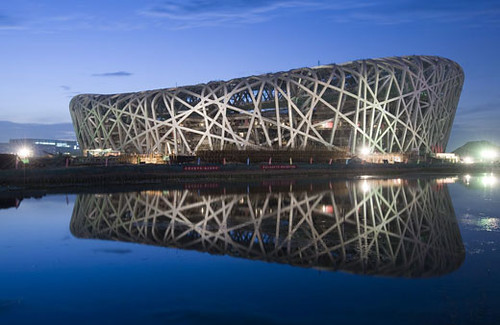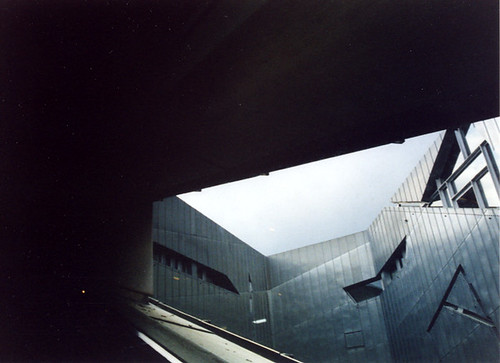[We've touched on this before, but since we're talking about it, let's look at opposing views form Herzog & de Meuron and Daniel Libeskind.]
Herzog & de Meuron - National Stadium, Beijing
Architects of the Tate Modern and Beijing Olympic Stadium said in March, we can help change in China.
“It's very cheap and easy for architects and artists and film-makers to pull out or to make this kind of criticism,” Herzog says. “Everybody knows what happens in China. All work conditions in China are not what you'd desire. But you wear a pullover made in China. It's easy to criticize, being far away. I'm tempted almost to say the opposite...How great it was to work in China and how much I believe that doing the stadium [and] the process of opening will change radically, transform, the society. Engagement is the best way of moving in the right direction."
Studio Libeskind - Jewish Museum, Berlin
Libeskind on the other hand flatly refuses to work in China.
“I won’t work for totalitarian regimes… I think architects should take a more ethical stance.”
His comments follow Prince Charles’s announcement last month that he will not attend the Beijing Olympics because of Chinese policy towards Tibet, and Steven Spielberg’s resignation this week as artistic adviser to the games.
It also comes only weeks after BD revealed that Zaha Hadid has designed a centre to honour a dictator in Azerbaijan, opening a wider ethical debate on working in countries with poor human rights records.
Libeskind was criticized by dutch architect Erick van Egeraat, who called it a a publicity stunt.
“I think its pretty easy and general to suddenly point the finger at one country,” Van Egeraat told BD.
“I could say the same thing about Russia, or France, or anywhere. To try and ideologise architecture is totally wrong. You completely overestimate its power. Architecture can be used to promote an ideology - you need to be aware of that - but it doesn’t make the architect or the stone and brick bad."
Is it more arrogant for westerners to dismiss a whole country, or to use design to promote their own ideologies?
I think Architecture For Humanity founder Cameron Sinclair nails it with a different spin in his post titled What is your ethical footprint?
I happened to stumble upon a debate on whether architects should work in China. It was sparked by Daniel Libeskind in Ireland last week and is now being called a "stunt". I am amazed that the leading voices of the profession are eager to pass judgment on the ethics of working in an entire country. What if you are building a health center or rural school in a country with questionable leadership? Is Libeskind therefore suggesting all Chinese architects are unethical? Where is the dividing line here and what right do we have to make one?
Everyone involved in this squabble are completely missing the boat. The real ethical dilemma our profession faces is closer to home – the way in which we build our buildings. It is not our just our environmental footprint but our entire ethical footprint that truly matters.
In Dubai and Doha, where many high profile designers are taking huge commissions, many developments are supporting and encouraging unfair and unsafe construction labor practices that are about as close to indentured servitude as you can get. Last year I visited the labor camps and was stunned to find 8-10 to a room and no access to clean drinking water. Many of the men I met had come from India, Nepal, Sri Lanka and China – most had been away from there families for years and knew the dangers of working on site. In the UAE alone there are 2.7 Million migrant workers, making up 95% of the country’s workforce. Even a recent report by Human Rights Watch released in 2006 barely caused a response from the industry.
Why is this a big deal? A few years ago I attended a talk on violence in the Middle East. One of the speakers, Queen Noor, spoke about the fact that the insurgency and hatred toward the west was being compounded by the 70 million+ disenfranchised youth that are either unemployed or working in low paying jobs, such as the construction industry. It made me think about those sky-piercing structures under construction and whether the poor labor conditions that we are a profession are willing to overlook may come back to haunt us.
However I am still to hear the current design leaders take a stand for those workers who are building these grand structures. Are those commissions are too seductive for any of them to take a stand?
Next time they take one of these gigs perhaps they can require ethical labor practices to be included in the contract.
Monday, July 21, 2008
Aesthetics and Ethics, China Edition
Posted by:
Unknown
at
7/21/2008 08:08:00 PM
![]()
Subscribe to:
Post Comments (Atom)

2 comments:
There's a pretty well-established line drawn between a nation's people and that nation's government. I think art can take guidance from this just as much as politics does (or war, for that matter).
Were I an architect, I'd have to think long and hard about doing something for the Olympics. Granting the Olympics to China was basically an endorsement of the entire Chinese system on the part of the established ruling class of nations. If you assist the government of China with its efforts to put on the Games, you're tacitly endorsing the same system. On the other hand, working for Chinese people simply gives them beautiful functional things that make life better. I don't see how that's anything other than praiseworthy. There's obviously a continuum (designing a building for a major Chinese company? a state-run school?).
I think I'd probably tend to avoid Gulf States projects as well, for the precise reasons that Sinclair lists. It's even worse that the money flowing into those nations at the moment should allow those buildings to be constructed by among the best-paid laborers in history. The Gulf States seem to have two competing tendencies: first, pragmatism when it really counts; second, a remarkable ability to set up different sets of rules for different groups of people (non-Muslims can legally drink in that part of the world, non-Muslims can't, though some surely do). We'll have to see which wins out.
I'm a real fan of this blog, by the way. Keep up the good work!
Daniel Libeskind announced a new project in Hong Kong a few weeks after his speech about China. Did you not come across this article on Building Design?
http://www.bdonline.co.uk/story.asp?sectioncode=426&storycode=3110409
Post a Comment